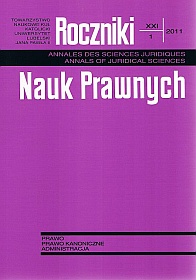Procedural Declaration of the Respondent’s Absence in a Nullity Case
Abstract
The study discusses the question at which procedural stage a party is to be declared absent in a cause if the party does not respond to the summons. The provisions of the Code of Canon Law, adopted and rendered more precise by Article 138 of the Dignitas connubii instruction, seem to be unequivocal, however a more attentive reading of the Instruction will raise some doubts.
In order to resolve this question, the Authors analyse a legal argument which favours a relatively immediate declaration of absence, which however seems weak in the light of Canon 1691. Then article focuses on the right to defence and the principium contradictorii determination of truth as the goal of the proceedings (which favours the declaration of absence to be delayed as late as possible), and finally the economy of the process.
The Authors postulate it necessary to avoid the imposition in the citation of an absolute obligation upon the respondent either to provide a reply or to appear in the Tribunal. In the event of the party’s non-appearance it is correct declare it absent from the proceedings only when all attempts to induce participation have failed.
Copyright (c) 2011 Roczniki Nauk Prawnych

This work is licensed under a Creative Commons Attribution-NonCommercial-NoDerivatives 4.0 International License.


